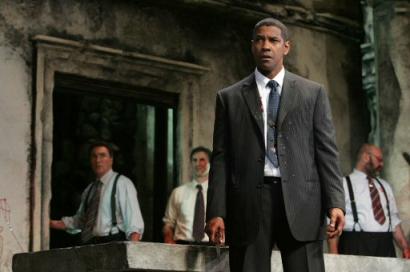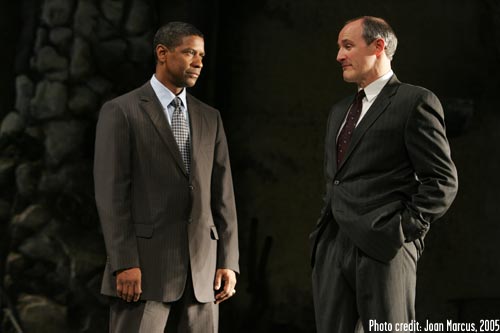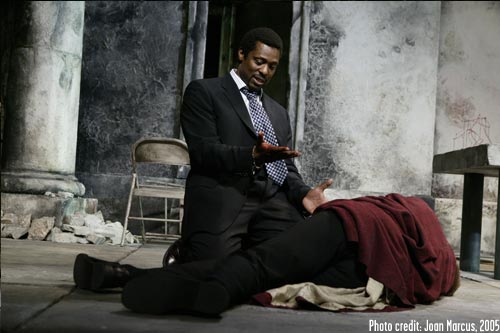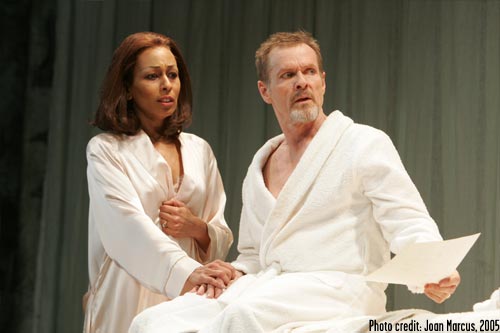 By way of Cliopatria, What book are you? Sixty-four different choices, and they aren’t as readily guessable as in most online quizzes. As it turns out, I’m “Watership Down…Though many think of you as a bit young, even childish, you’re actually incredibly deep and complex. You show people the need to rethink their assumptions, and confront them on everything from how they think to where they build their houses. You might be one of the greatest people of all time. You’d be recognized as such if you weren’t always talking about talking rabbits.” Ah, rabbits.
By way of Cliopatria, What book are you? Sixty-four different choices, and they aren’t as readily guessable as in most online quizzes. As it turns out, I’m “Watership Down…Though many think of you as a bit young, even childish, you’re actually incredibly deep and complex. You show people the need to rethink their assumptions, and confront them on everything from how they think to where they build their houses. You might be one of the greatest people of all time. You’d be recognized as such if you weren’t always talking about talking rabbits.” Ah, rabbits.
Category: Arts and Letters
The Trouble For Harry.
This, the sixth volume of the series, [is] the darkest and most unsettling installment yet…” (If you’ve gone completely spoiler-less, do not read this NYT review.) And now, if you’ll excuse me, with book in hand, I’m off to get my Potter on. Update: Done. Another fine outing, I thought — I posted a heavily spoiler-laden reaction over at WebGoddess.
Sippin’ on Gin and Ingsoc.
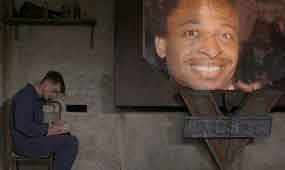 “Just what does Tanqueray have in mind here? How is this foppish hipster supposed to sell gin?” Old friend Seth Stevenson assesses Tanqueray’s new spokesman, Tony Sinclair, who has come to grace a number of bus stops and billboards in my area. For the most part, I think gin is pretty vile — When it comes to the spirits, I’m a Jameson man. That being said, I did enjoy a glass of Victory Gin while re-watching Michael Radford’s powerful version of Nineteen Eighty-Four over the weekend. Winston Smith…now there’s a spokesman Tanqueray should get behind. Doubleplusgood.
“Just what does Tanqueray have in mind here? How is this foppish hipster supposed to sell gin?” Old friend Seth Stevenson assesses Tanqueray’s new spokesman, Tony Sinclair, who has come to grace a number of bus stops and billboards in my area. For the most part, I think gin is pretty vile — When it comes to the spirits, I’m a Jameson man. That being said, I did enjoy a glass of Victory Gin while re-watching Michael Radford’s powerful version of Nineteen Eighty-Four over the weekend. Winston Smith…now there’s a spokesman Tanqueray should get behind. Doubleplusgood.
Free Fallin’.
By way of Boing Boing, a mannequin falls in perpetuity (with the occasional aid of your mouse.) Creepy, but also weirdly entrancing.
Digital Swans.
A programming note: If you missed Gill‘s performance of Swan Lake last night, it’ll be rebroadcast a few times in the next few days (check your local listings) and is available for DVD pre-order.
Little Sisters Make Good.

 Yep, the sisters are doing it for themselves. Gillian‘s earlier-touted performance of Swan Lake will be broadcast on PBS tomorrow (Monday) at 9pm. And, congrats are due also to Tessa, who graduated from Oscar Smith High over the weekend, and was recently profiled (as valedictorian) in The Virginian-Pilot. Y’all go, girls!
Yep, the sisters are doing it for themselves. Gillian‘s earlier-touted performance of Swan Lake will be broadcast on PBS tomorrow (Monday) at 9pm. And, congrats are due also to Tessa, who graduated from Oscar Smith High over the weekend, and was recently profiled (as valedictorian) in The Virginian-Pilot. Y’all go, girls!
Sylvia on Pointe.
 “Gillian Murphy, who danced Sylvia on Friday, looked as if she were born to dance this role. Her natural, bold attack and imposing presence make her the perfect Sylvia.” Gill’s star turn in ABT’s revival of Sylvia (which I caught at the Met on Friday) opens to stellar reviews. In addition, Gill is profiled in this month’s Pointe Magazine. (Unfortunately, the text is unavailable online, although the pics are here.)
“Gillian Murphy, who danced Sylvia on Friday, looked as if she were born to dance this role. Her natural, bold attack and imposing presence make her the perfect Sylvia.” Gill’s star turn in ABT’s revival of Sylvia (which I caught at the Met on Friday) opens to stellar reviews. In addition, Gill is profiled in this month’s Pointe Magazine. (Unfortunately, the text is unavailable online, although the pics are here.)
Aigh!! Books!!!
By way of a colleague in the program, conservative rag Human Events lists their choices for the Ten Most Harmful Books of the 19th & 20th Centuries (because remember, folks — reading & thinking are dangerous.) The usual rogues’ gallery — Marx, Hitler, Mao — are up front, as you might expect, but then things get kooky. Including Darwin is medieval enough, but Betty Friedan and Rachel Carson? You must be joking. (Well, at least it’s good to see the right-wing fringe still running scared from progressives like John Dewey and Herbert Croly.)
Senryu in the City.
“How can we fix us? The fights, the silence . . . I know! Let’s get a puppy!” A hearty congrats to Joel Derfner, who’s both a friend from college and the brother/roommate of a good friend here at Columbia, on the publication of his recent book, Gay Haiku (a project which originated on his blog…assuredly a better way to make this hobby pay than the Kottke route.)
Washington in Rome.
“Why should his name be sounded more than yours? Write them, yours is as fair; Sound them, Yours doth become the tongue as well.” Why? Well, cause he’s a full-fledged movie star, that’s why. Still, despite having a bit of a muttering problem at times, Denzel acquits himself “honorably” as Brutus in Julius Caesar, which I saw last night at the Belasco Theatre. Set in a half-post-apocalyptic, half-Depression-era Rome that evokes anything from Masked & Anonymous to Black Hawk Down, this version of Shakespeare’s classic is innovatively staged and well-worth seeing, but, unfortunately, it also suffers from a stylistic dissonance that hinders the play at its most crucial moments.
The central problem with this production is the clash of acting methods. Many of the actors — and particularly Denzel — underplay their roles to the extreme. In fact, in delivery if not in diction, Denzel’s naturalistic Brutus is only a step or two from most of his other performances, be it Glory, Devil in a Blue Dress, or The Manchurian Candidate. That would be fine, if everyone else was on the same page, and a lot of the other actors are. Jack Willis (at left) deadpans Casca like Cypher from The Matrix, and Patrick Page steals his one major scene (in which he convinces Caesar to report to the Senate on the Ides of March) by portraying Decius Brutus as the worst kind of unctuous DC aide, complete with a leather executive folder in tow and a flatterer’s simper plastered on his face.
Unfortunately, some of the other actors didn’t get the memo. Bill Sadler’s Caesar is prone to acts of grandstanding, but that’s acceptable — he’s Caesar, after all, and bestrides the narrow world like a Colossus. No, the main offender is Colm Feore as Cassius, who plays the lean, hungry Machiavel in full “Master Thespian” mode — at times he’s hammier here than he was in Riddick. I’ll admit, I may be being a bit hard on Feore, as Cassius has always been one of my favorite Shakespearean characters (well, until he gets all weepy and high-maintenance in the second half of the play.) And Feore’s performance might be fine for a different cast of Caesar…but here, he’s just off. If this is Denzel’s Julius Caesar, as everything seems to suggest, Feore’s portrayal of Cassius should have mirrored Denzel’s low-key, understated Brutus. Instead, Feore is overplaying to the hilt, and the contrast is jarring in every scene the two central plotters share.
The Denzel-disconnect causes problems elsewhere, too, notably in the crucial Act III funeral speeches. Eamonn Walker makes a fine Mark Antony throughout, but he just doesn’t have the star wattage or natural charisma of Denzel Washington. As a result, Antony’s manipulative eulogy — the critical hinge moment of the play — seems slightly tepid and uninvolving compared to Brutus’ earlier rousing oratory. It’s possible that I’m just ruined by the James Mason-Marlon Brando version, as there does seem to be some precedent in the play for this take: “I am no orator, as Brutus is…I have neither wit, nor words, nor worth, action, nor utterance, nor the power of speech, to stir men’s blood.” Still, I think there’s a dramatic problem if Brutus’ oration is more of a showstopper than Antony’s. If anything, it seems here that their roles should have been reversed.
Still, despite these grievances, Julius Caesar is a satisfying production for the most part, with some particularly nice visual flourishes throughout. The Escape from New York, Berlin-bunker look of the set seems strange at first, but gains potency as the play darkens — in the “Cinna the poet” mob scene, for example. (Speaking of which, between this and Sith, it’s been a bad week for republics.) And I particularly liked the look of the Senate, even if it was somewhat reminiscent of Liev Schrieber’s EXCOMM war room in the Henry V revival two years ago. (With that in mind, the play gets off a great Homeland Security gag, as the various conspirators have to figure out a way around the Senate metal detector.)
The war scenes of the final acts are also surprisingly kinetic, with Roman forces garbed in guerilla green or black weaving through the hollowed-out set and spouting commands in verse. In fact, while I guess this shouldn’t be a shock given the subject matter, this production of Julius Caesar is also quite grisly — they don’t skimp on the blood and gore, and Sadler’s corpse is frozen in a horrifying Ring-like rictus scream during the Antony speech. (Strangely, this produced nary a shudder in the crowd, while the mere sight of Caesar’s bare posterior earlier on sent the audience into a paroxysm of shocked gasps — the MPAA has screwed up this country something fierce.)
So, in sum, Julius Caesar is a worthy production that makes for a good evening out, but it’s got some issues that keep it from being an all-time classic version of the play. The fault, dear readers, is not in its stars, but in its supporting cast, that they are underlings. In the end, a more balanced production, with either more or less star power, would have probably worked out better.

